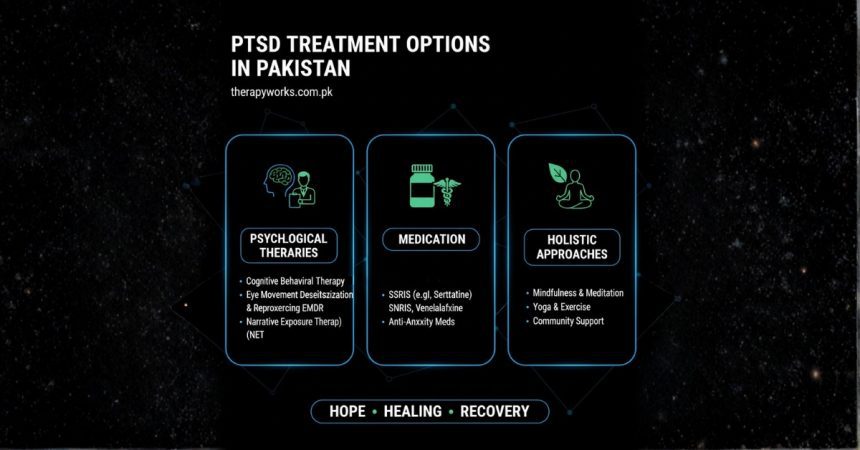Post-Traumatic Stress Disorder (PTSD) is a mental health condition triggered by experiencing or witnessing traumatic events. In Pakistan, PTSD is a significant concern due to factors like natural disasters, political conflict, and violence. As a result, access to effective PTSD treatment in Pakistan is crucial. Individuals suffering from PTSD often experience overwhelming feelings of anxiety, distress, and helplessness.
Understanding PTSD in Pakistan is crucial to providing effective treatment, improving awareness, and reducing stigma. With proper support, individuals can manage symptoms and improve their quality of life.
Prevalence of PTSD in Pakistan
Pakistan has faced numerous traumatic events, including political unrest, natural disasters like earthquakes, and the aftermath of terrorism. According to a 2019 study, approximately 3.5% of Pakistan’s population suffers from PTSD. However, this number could be much higher due to underreporting and stigma surrounding mental health.
Symptoms and Signs
PTSD manifests in various emotional, cognitive, and physical symptoms. Common signs include:
- Emotional symptoms: Intense feelings of fear, sadness, or anger.
- Cognitive symptoms: Intrusive memories, flashbacks, and difficulty concentrating.
- Physical symptoms: Sleep disturbances, fatigue, and hypervigilance.
Recognizing these symptoms early is crucial for effective treatment. Individuals who experience these symptoms should consult a mental health professional.
Traditional and Modern PTSD Treatment Approaches in Pakistan
Treatment for PTSD in Pakistan has evolved over the years. Both psychological therapies and medications play a role in recovery.
- Psychological Therapies
- Cognitive Behavioral Therapy (CBT): CBT helps patients identify and challenge negative thought patterns, allowing them to manage anxiety and stress effectively.
- Eye Movement Desensitization and Reprocessing (EMDR): This therapy uses guided eye movements to help patients process traumatic memories in a healthier way.
- Medications
- Commonly prescribed medications include antidepressants (SSRIs like fluoxetine) and anti-anxiety medications to alleviate symptoms.
- Medication is often paired with therapy for the best results.
- Traditional Healing Practices
- Spiritual and religious counseling: Many people in Pakistan seek comfort from religious leaders or spiritual healers to address mental health concerns.
- Herbal remedies: Some traditional remedies, like herbal teas, are also believed to help with anxiety and stress.
Challenges to PTSD Treatment in Pakistan
Despite the availability of treatments, several challenges remain:
- Mental Health Stigma: There’s a significant stigma associated with seeking mental health treatment in Pakistan, often preventing individuals from seeking help.
- Limited Access to Professionals: In rural areas, access to qualified mental health professionals remains scarce.
- Socioeconomic Barriers: The cost of treatment and lack of insurance coverage for mental health care can make treatment inaccessible to many.
How to Support a Loved One
Supporting a loved one with PTSD can be challenging but is crucial for their recovery. Here are a few tips:
- Be patient: Understand that healing takes time, and avoid pressuring them.
- Listen actively: Sometimes, the best way to help is by offering a listening ear.
- Encourage professional help: Gently encourage seeking treatment from professionals.
Conclusion
In Pakistan, treating PTSD requires a combination of psychological support, medication, and cultural sensitivity. While challenges remain, there is hope for recovery through modern treatments and support systems. Overcoming stigma and ensuring access to care will lead to a brighter future for those struggling with PTSD in Pakistan.
Summary Table
| Key Statistics | Data |
| Prevalence of PTSD in Pakistan | 3.5% of the population |
| Common Treatment Methods | CBT, EMDR, Medications |
| Leading Treatment Centers | Therapy Works Pakistan, Aga Khan University Hospital, Punjab Institute of Mental Health |


Leave a Reply